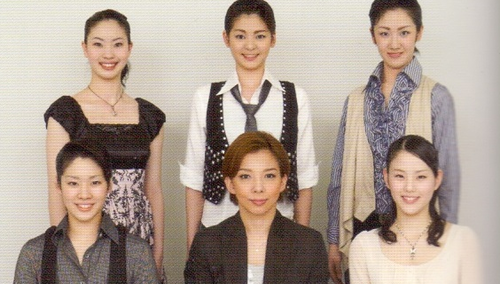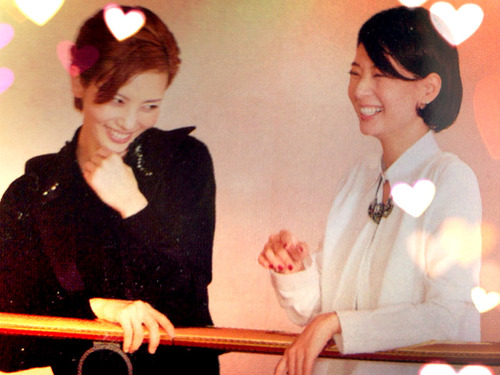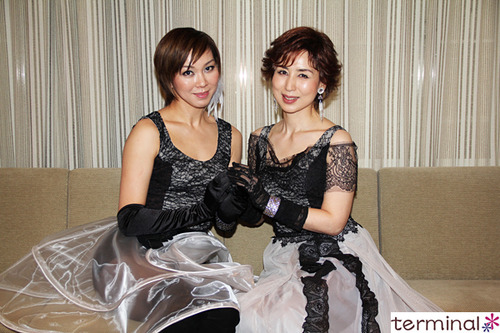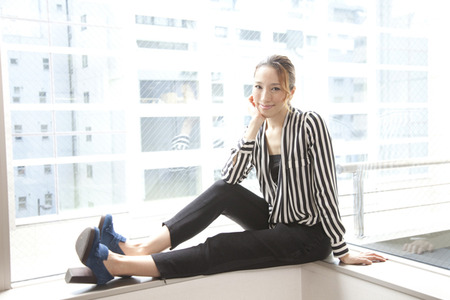From the May 2014 issue of Graph
SOU: Instead of talking about our Hanagumi era, It’s probably better to talk about when we were together in Yukigumi, right? Because you might not remember me from then, Komu-san (haha).
ASAMI: Nooo, I remember properly. RanTomu is your classmate, isn’t she?
SOU: That’s right.
ASAMI: RanTomu has shined brightly since that time. I got the impression that if she’s like the sun, you’re like the moon, Eritan. I always thought, ah, such beautiful people.
SOU: What?! So that’s how you’re going to use this conversation!
ASAMI: No it’s not (haha). That was just my first impression.
SOU: My first impression of you was a shinjin kouen.
ASAMI: Might that be, Bud?
SOU: Yep! Bud from “How To Succeed.” You were so cute, it made for a memorable performance.
ASAMI: Ahaha.
SOU: Your voice then, and the way you said your lines, I remember it all!
ASAMI: The director at that time, Ogita-sensei, imitates me to this day. Was I really that weird? I’m still reflecting on it after all this time (haha).
SOU: No, no. The impression you left was amazing, for only being a ken-6 at the time.
ASAMI: You must have been ken-1… that’s how much we were separated in our grades, right?
SOU: Eeehh, comparatively (haha).
ASAMI: *Laughs* Of all the productions I got to do in Takarazuka, “How To” is probably in my top 5. The people from Broadway came for the choreography, and it felt like the real thing.
SOU: I love it too! I aaaalways came out to watch the finale number, and some others!
ASAMI: Eritan, I wouldn’t be surprised if you were in the finale though.
SOU: I was only ken-1! So we did the kick line with the dollar signs attached to our chests. But, in the regular version, we appeared in the “Brotherhood” scene. It was amazing, dancing right behind Tamo-san (Aika Mire).
KOMU: You’re even on the video!
SOU: Yes I am. Since the instructors were from overseas they didn’t have a relationship with anybody, so they arranged the people who stood out in order… One of them was me, even though I didn’t look good in a suit yet (haha). Afterwards, in “Coffee Break” we supported the table everyone danced on.
ASAMI: I did that too! In the shinjin kouen. I didn’t play Bud until act 2, so in act 1 I carried the table.
SOU: We were working boys.
ASAMI: Working boys! How nostalgic!
SOU: By the way Komu-san, you were in the shinjin kouen for “Hollywood Babylon” too! How should I say it… the image of you on stage, it really leaves an impression. I love the song you sang with Toshiko-san (Suzukake Miyuki), “Tom Sawyer!”
ASAMI: That was good, wasn’t it. I sang it at my dinner show after Takarazuka, but the majority of the people were like, “What song is this?” (haha)
SOU: It’s great, it’s a core selection. Don’t worry, Ranju and I know it (haha)
ASAMI: *Laughs* Come to think of it, you’ve been at it for a long time, Eritan. What year are you now?
SOU: In April I’ll be ken-19. Komu-san, by that time you’d already left, right?
ASAMI: I left at ken-16.
SOU: Amaaazing!
ASAMI: No, if one of us is amazing, it’s you!
SOU: Ah, I guess.
ASAMI: *Laughs* That you’d hold on this long since my graduating year… for the first time, I really looked up to you.
SOU: You looked up to me!
ASAMI: You’ve grown up.
SOU: I was raised under your guidance, after all…
ASAMI: The working boy climbed the ladder this far, I couldn’t be happier (haha).
———————————————
ASAMI: After Hanagumi’s “That’s Revue” at the Grand Theater, the Bow Hall performance of “Blue Swan” was my last before I went to Soragumi…
SOU: After that there was an empty period, and then our reunion took place in Yukigumi’s “Flaming Love.”
ASAMI: You had the lead in the shinjin kouen, didn’t you.
SOU: At that time, you did something that really stuck with me.
ASAMI: What, what, what did I do (haha).
SOU: After the shinjin kouen performance ended, you said this one thing to me: “A million people have probably told you this already, but you were good.” More than anyone else’s impressions, that remained in my heart.
ASAMI: Wow, I was really rude (haha).
SOU: It wasn’t rude, I was so happy! Since our Hanagumi era had passed without much opportunity for us to talk, it was the first time you’d properly recognized Sou Kazuho, other than to call out to greet me!
ASAMI: There’s no way that’s true (haha). But you really were good. The costumes from Chinese-themed shows suit your aura perfectly. Your ability and your beauty combined to make a magnificent shinjin kouen.
SOU: Eeeeeeeeeh!!!
ASAMI: Really. I had nothing to worry about, and I was able to watch it with peace of mind.
SOU: I didn’t comprehend the fear of being on stage for a Grand Theater shinjin kouen at all. I’d never been so anxious in my life as I was for that performance.
ASAMI: You achieved a striking debut in Yukigumi… then, on from there.
SOU: After that you became top. It was awesome, we were able to appear in so many plays together. I even played your older brother twice.
ASAMI: That’s right!
SOU: In “Susano-o” and “Romance de Paris,” but I wondered why the heck am I the older brother… (haha). I think it must be because you look so young.
ASAMI: No way. It’s because you appear so composed, Eritan.
SOU: Is that so… Speaking of plays in which we appeared together, there was also “A Dream One Day.”
ASAMI: Ah, yes! In BeruBara, you were, uh, Fersen?
SOU: …he wasn’t in it.
ASAMI: Ah, that was this time (haha).
SOU: “We ought to pull back…” (1)
ASAMI: Gerodelle!
SOU: You at least got the right conclusion that it was a noble (haha). Your Oscar was INSANELY cute!…though it’s probably rude of me to say that.
ASAMI: No no no
SOU: Ever since before that when you played her in a TCA special, I’d thought, wow, what a doll-like Oscar! When it was decided you’d do it in the Grand Theater, I was so happy! We got to be in a show together again… that I came to be able to enjoy dramas, was because of you. “So this is what a drama is all about,” I learned that from you.
ASAMI: Nooooo—that’s embarrassing.
SOU: Your performance would be different every time, and I’d wonder, “How will it turn out today…” This may be an impolite way of saying it, but performing with you while I was an underclassman was really fun.
ASAMI: I’m happy to hear you say that.
SOU: You accompanied me, an underling with no real talent.
ASAMI: That’s not true (haha).
SOU: I took everything from you. I’m being impolite again…
ASAMI: I didn’t do anything, Eritan.
SOU: Whenever I’d make a mistake, you’d say “Don’t worry it’s ok.” Something I remember really well is that even after you became top, if there was an occasion when you messed up your lines, even if your partner was an underclassman, without fail you’d apologize. Like, “I absolutely get like this too.” For a performer this may be obvious, but that’s not so easy to do.
ASAMI: No, no. I made so many mistakes, I was really a bother to everyone. If I didn’t apologize, my heart would break (haha). When you’re standing in the top spot, every day is like walking a tightrope, but the people around you are there to support you. Without them it becomes an impossible position, and because there’s the feeling that you’re cultivating one production together with your colleagues, their grade has nothing to do with it. I think it’s the same doing performances now.
SOU: For me, seeing a top star through from debut to sayonara, you were my first.
ASAMI: For me it might have only been Yan-san (Anju Mira).
SOU: It became like that when you changed troupes, right?
ASAMI: So I’m happy, that I got to see someone through properly from start to finish.
SOU: Yes! Like, I can tell you everything about this top star…
ASAMI: Tell whom?! haha
SOU: I was happy that it was you.
———————————————
ASAMI: My first performance when I came to Yukigumi was “Lovers’ Suicide,” so right after you and I came there were nihonmono and Chinese-style shows.
SOU: That’s true. I was surprised at first, everyone was so amazing. How quickly they memorized their movements, their traditional dance…
ASAMI: Everyone was perfect, weren’t they.
SOU: I really couldn’t memorize the movements, and I panicked.
ASAMI: Because in Hanagumi they hardly put on any nihonmono. In that unaccustomed state I entered the world of “Lovers’ Suicide.” I joined from the Tokyo performance, but the moment I entered the rehearsal room, everyone was the real thing.
SOU: Ah I’m crying—that’s so true—
ASAMI: It was like, is this the Meijiza? (2) Or some other theater? (haha). When I really think about it, they were all underclassmen. Even Yumemi (Asaki), the youngest one to join, looked like someone from the Meijiza.
SOU: Now or then, that hasn’t changed (haha). It was really a performance where the actors were in sync.
ASAMI: Even in the casual scene in the red light district, I didn’t know what to do. When the geisha were all dancing together and I was just intently keeping time, the director Tani-sensei told me, “Please move a little” (haha). I couldn’t even do something as trivial as chatting. Suddenly, maybe to make it more fun, before I knew it I had spread both hands wide and made like an “oooh!” gesture. But then I thought dammit! That’s something a foreigner would do! The moment I lost focus just a little, that happened (haha)
SOU: I know what you mean (haha)
ASAMI: We were really baptized in the waters of “Nihonmono Yukigumi” immediately, weren’t we.
SOU: We really were.
ASAMI: As for Yukigumi and nihonmono, I thought they’d really dwindled, but then you became top, and it seems like they brought them back.
SOU: It does. But in spite of the fact that there were so few of them for a short time, things like the power of the performances and the vocal abilities all the way down through the underclassmen, these are unchanged. They get passed down continuously.
ASAMI: It’s a bit of a relief to sense that that’s continuing even now. I’m glad that hasn’t disappeared since my era.
SOU: It’s totally ok!
ASAMI: Because even though the color changes according to the top star, the part about calling it “nihonmono Yukigumi” is always left behind. After all there’s a sense of not wanting to break that during your reign, isn’t there?
SOU: There is.
ASAMI: So I’m happy to be connected to the next generation.
SOU: You saying that makes me happy too.
———————————————
SOU: About the 100th anniversary, there are a lot of events, aren’t there.
ASAMI: Even just looking at the names of the people participating in the memorial ceremony in April is amazing.
SOU: Since we active members are the lowest underclassmen, our names are probably the smallest (haha).
ASAMI: Even I’m like a baby still in diapers.
SOU: In that case, I’m still in the womb… (haha). As expected of the 100th anniversary.
ASAMI: Last year, I participated in the DREAM, A DREAM performance, but a number of very distinguished people also performed. That time, during an after talk show, when I looked down from the last seat at everyone from Ootori Ran-san sitting in grade order, the faces of consecutive generations of tops were all lined up. With them in a line like that, being at the end of it I could see them clearly. When everyone turned toward me, I was overcome with emotion and I was so moved that tears just came out. If you line up the achievements of these people in their lifetimes one by one you get 100 years, the weight of that history. Now it’s really hitting me again how deeply moved I am to have been even a small part of that.
SOU: The things we are inheriting even now sure enough came from long ago, and it’s for that reason that we ourselves have something to leave for the next generation. Because I’m active right now, I’ve been thinking about that an awful lot. But it’s not limited to the 100th anniversary, whatever the generation, I think everyone leaves behind some strong hope as they leave the nest. I want there to be something like that for me too.
———————————————
ASAMI: “The Rose of Versailles” was the first show of yours I’d seen in a while, but you were really fabulous.
SOU: What are you saying? (haha)
ASAMI: Even though it was your debut performance, you weren’t uncertain at all, you were shouldering the responsibilities of a top star perfectly, and it was really wonderful.
SOU: No, no…but, when I did my first revue, “Congratulations Takarazuka!!” I was extremely anxious about standing in the center. Komu-san, you came to watch very soon after we opened, didn’t you. Without thinking I texted you, “Please tell me if I’m terrible!” You replied “I wouldn’t tell you that in a text message” (haha). In the end, you graciously talked to me on the phone for close to an hour…
ASAMI: It was nothing.
SOU: That time, you talked to me about things you could tell me because you had been top, about specific things that were necessary for myself right then, and moreover you did it with love. Being able to talk to you, with whom I’d come this far, even though now you’re in a different field, was such a privilege and it made me so happy.
ASAMI: For sure, there are so many things to understand about first standing in that position. I’m the one who’s happy you consulted with me, rather. Chika-chan (Mizu Natsuki) who came to see it with me said so too.
SOU: Ah yes, Mizu came too. I was so desperate.
ASAMI: You were together with me for such a long time, and you were with Chika-chan in Hanagumi too, right? Since the two of us had been watching you for such a long time, there were things we thought we could say to you. I’m happy we’ve come to have that kind of relationship.
SOU: Aaaaaaaah, that makes me so happy…
ASAMI: When I watch this current elegant Eritan, it’s with the affection of a parent or a sibling.
SOU: Because I’ve done nothing but play your older brother (haha).
ASAMI: Big brother has become this lovely! I’m so impressed, and I’m happy you became top of Yukigumi. Protecting the tradition is important, and even though I said there would be many burdens, above all else, Eritan, please stretch out leisurely and enjoy every day from now on. And take care of your body!
SOU: Yes.
ASAMI: It’d be bad if you got injured.
SOU: Yes Mama!
ASAMI: It’s dangerous, Mama is full of things to worry about (haha). You’d better graduate safely and come over to this world.
SOU: Finally, I can be born (haha).
ASAMI: Enjoy each day, and do your best with energy as your motto.
SOU: Yes. Having people who treat me this warmly, and watch over me, as far as I’m concerned no matter how hard things get now… it’s like a miracle that as I’m constantly fighting with myself there are people who help me relax, and then I can stand on my own feet, lead the troupe, and make a fresh start. That time, I wanted to talk to you because you were on that side.
ASAMI: Is that so (haha).
SOU: Getting that kind of message from you even for an instant, gave me a lifetime’s worth of power!
ASAMI: Oh stop it.
SOU: Thank you so much for today!
ASAMI: It was nothing. I should be thanking you.
———————————————
NOTES:
(1) Eritan is quoting the show to jog Komu’s memory
(2) The Meiji Theater, a famous kabuki theater in Tokyo that opened in 1873




